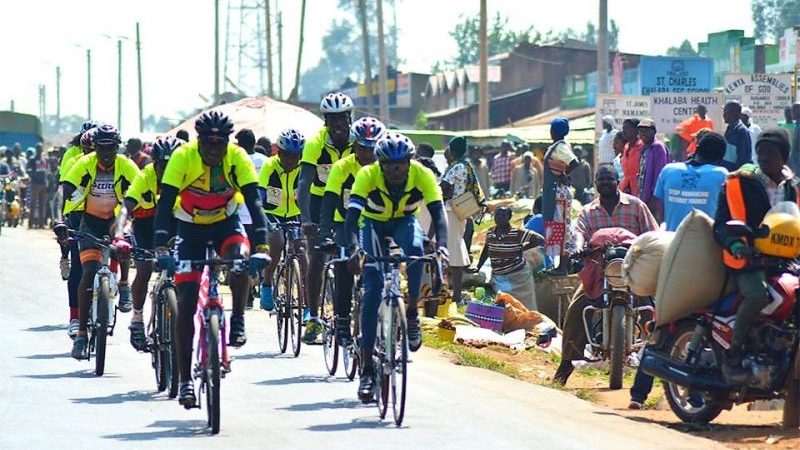As the Kenyan election campaign gains momentum, so does a group of cyclists promoting access to renewable energy.
Ten professional cyclists and 10 other clean energy advocates are touring 10 of the 47 Kenyan counties from 12 June to 2 July, encouraging voters to demand access to clean energy.
The cycling caravan is part of Christian Aid’s “Big Shift” campaign, which calls for investment to be diverted from fossil fuels to renewable energy. Kenya Youth Climate Network (KYCN), Pan African Climate Justice Alliance (PACJA) and the Africa Coalition for Sustainable Energy are also involved.
According to George Mwangala, Christian Aid’s Big Shift campaign assistant, the cycling caravan is lobbying election candidates for clean energy policies. Before they got involved, he told Climate Home, political parties were only talking about access to energy and ignoring renewables.
“We have seen the clean energy messages coming up in this election campaign after our media engagement in the last three months,” said Mwangala. Kenya goes to the polls on 8 August.
Profile: Can this woman restore Kenya’s faith in solar power?
Esther Passaris, who is representing the Orange Democratic Movement (ODM) under a coalition of five political parties, the National Super Alliance (NASA), said access to clean energy is her priority.
“A lot of people in Kenya want to use solar energy but the cost of installation is prohibitive,” she told Climate Home. “This needs to change.”
Interviewed as the coalition was about to launch its manifesto, Passaris said clean energy and green growth is their priority.
“As a candidate, I now understand the importance of prioritising climate change,” she said. “A manifesto is not cast in stone. If it doesn’t go far enough to address our energy needs in a sustainable way, we’ll change it.”

Riders arrive in Makueni (Pic: Christian Aid)
Mwangala said this campaign is meant to close the energy gap in a sustainable way as a way of transitioning to low carbon development. In 2014, only 36% of the Kenyan total population of 46 million had access to electricity.
“We have started the process of ensuring that clean energy becomes an enabler of the County Integrated Development Plans of 2018-2022,” said Mwangala.
He said solar and biogas are abundant sources of renewable energy in the communities that the caravan is visiting.
The cycling caravan was informed by an opinion poll that revealed 64% of Kenyan voters would vote for a political party that prioritised access to clean energy. Since its launch, said Mwangala, the caravan has engaged with government officials, community members, development partners, academia and faith-based organisations to raise awareness. It will will culminate in a National Clean Energy Summit on 6 July.
Report: Kenya signs China deal for coal plant beside Unesco site
This is a critical move in nudging the government to commit to renewable energy and not double cross it with fossil fuels, said PACJA youth coordinator Julius Karanja. He said, on the one hand, the government professes to prioritise renewable energy while, on the other hand, it approves the exploitation of fossil fuels in some parts of the country. The Kenyan government was criticised for its recent decision to approve the construction of a Chinese-backed coal plant next to a UNESCO heritage site.
“Though both fossil fuels and clean energy are at the top of the government’s agenda, fossil fuels carry more weight,” said Karanja.
Isaac Mwaura, a lawmaker from the ruling Jubilee Party, defended the government’s record. Speaking to Climate Home, Mwaura said the government is focusing on three clean energy areas including solar, wind and geothermal.
“We have just passed the climate change legislation which addresses the issue of diversifying our energy sources,” said Mwaura. “That shows a highest level of commitment to renewable energy.”
Asked about fossil fuel deals, Mwaura said as a developing country that has contributed very little to global emissions to date, Kenya has a right to power its emerging economy with coal, oil and gas. “We need to strike the balance,” he said. “We have huge coal and oil deposits and this should help us develop.”
Since US president Donald Trump decided to withdraw from the Paris Agreement, he added, it would be harder to convince developing countries not to use fossil fuels.
According to the International Renewable Energy Agency (IRENA), by 2016 Kenya had installed 2GW of renewable energy, mostly hydropower and geothermal. The country has big untapped potential for wind and solar generation, according to the organisation.
